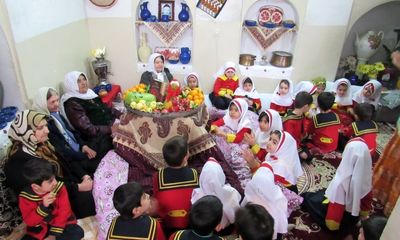In a statement published by the Persian service of ISNA on Wednesday, the authors wrote, “Children in Iran and across the world are spending hard days. Coronavirus and the economic and social condition have resulted in ignoring the children more than before, and our children are suffering from adversity, depression and boredom more than ever.
“The Yalda Night celebration is one of our beautiful traditions, which has always been closely connected with art, poetry and storytelling. Let’s try to make a happy and different memory of this year’s Yalda Night for our children.
“Let’s present them with books, tell them stories, play with them. Let’s make them familiar with the roots of their own profound, native culture and make them hopeful about a bright, humanistic, fair, happy and peaceful tomorrow.”
Tahereh Ibod, the writer of the bestsellers “Sea Tales of Liya Sand Maris” and “The Family of Mr. Charkheshi”, is one of the authors.
Also among the writers is Farhad Hassanzadeh, the author of the acclaimed books “Kuti Kuti Stories”, “The Backyard”, “The 7th Bench by the Lake”, “Bambak’s Scorpions” and “Watermelon with Love”. He has been nominated for the Hans Christian Andersen Award several times.
The big names such as Gholamreza Emami, Sahar Tarhandeh, Ebrahim Hassanbeigi, Nushafarin Ansari and Jafar Ebrahimi-Shahed are also seen.
Yalda, the last evening of autumn and the beginning of winter, is a ceremonious, auspicious time for Iranians and lovers of Iranian traditions everywhere on the earth.
Nationally called “Shab-e Yalda” or “Shab-e-Chelleh”, it literally means the night of the forty. This refers to the first forty days of winter that are often the coldest and toughest to bear.
The story of Yalda may perhaps be interpreted as a tale of courage and effort during darkness, a triumph of light and human warmth that ultimately causes the spring to bloom in our hearts.
People on Yalda Night are usually served with fresh fruits and a mixture of dry fruits, seeds and nuts in floral bowls. To Iranians, fruits are reminders of abundance in summer. Watermelon and pomegranates, as symbols of bounty, are the traditional fresh fruits of this night. It is believed that eating watermelon before the arrival of winter can immunize the body against illnesses.
Following a hot dinner, many people often recite poetry, narrate stories, chant, play musical instruments or just chat cozily until midnight or so.
Source: Tehran Times

